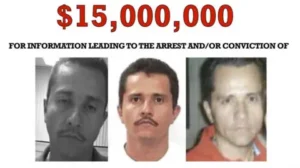🌍 LATAM's mining riches
Plus: The Canadian flag
Hi Intriguer. There was only a decade between my first visit to Peru as a backpacker, and my later stint there for work. But the changes in Peru were spectacular – its economy had almost tripled.
Mining was a key driver, and one particular image still sticks in my mind: I was grabbing lunch in the coastal city of Barranca when a miner walked in with his family – a new Toyota out front, kids in school uniforms, the latest Samsung cell in hand.
These were the trappings of a newly middle class life, and the same scene was playing out across millions of families in the region. But of course, it’s not all come easily. We dive into what’s next for Latin America’s mining sector in today’s top story.
– Jeremy Dicker, Managing Editor
PS – ¿Hablas español? ¡Check out our weekly edition in Spanish!
Was this forwarded to you? We're a team of ex-diplomats producing a concise and engaging geopolitical briefing for 85k+ leaders each day. It’s free to subscribe.
TODAY’S NEWS
Cross-border casualties in Lebanon and Israel. Several Lebanese civilians were reportedly killed and injured yesterday (Wednesday), after Israel launched airstrikes in response to a Hezbollah rocket attack on an Israeli military base that killed one.
Japan and the UK slip into recession. Germany has overtaken Japan as the world’s third-largest economy after the latter unexpectedly slipped into a recession due to a weak yen and an ageing, shrinking population. The UK also slipped into recession at the end of last year as households cut spending.
Indonesia’s comeback general claims victory. Prabowo Subianto, a former general with a dark past and a grandfatherly new image, has claimed victory in yesterday’s presidential election. While the final results could take weeks and the other candidates haven’t yet conceded, Indonesia’s reliable ‘quick counts’ suggest Prabowo comfortably cleared the 50% needed to avoid a runoff. He’s promising to continue the outgoing president’s focus on economic development.
Russia’s secret space weapon. Following a cryptic call by the Chair of the US House Intelligence Committee to declassify intelligence on a “serious national security threat”, reports are emerging of a Russian space-based nuclear capability to target US satellites. It’s not yet in orbit and not considered an urgent threat. The news comes as Congress remains bitterly divided over whether to keep helping counter Russian threats against Ukraine, a factor some say could’ve motivated the Chair to shine a light on Russia’s new capability.
Canada, Australia and NZ call for immediate Gaza ceasefire. The three countries have called for an “immediate humanitarian ceasefire” in a joint statement, flagging the civilian toll of Israel’s planned Rafah offensive. Their statement also calls for Hamas to “lay down its arms and release all hostages immediately”, after stating that “Palestinian civilians cannot be made to pay the price of defeating Hamas”. Separately, Israel has said it won’t rejoin negotiations for a ceasefire until Hamas softens its demands.
Putin prefers Biden? Appearing on Russian TV, President Vladimir Putin has expressed a preference for a Joe Biden presidency over Donald Trump in the White House, calling Biden more experienced and predictable. Whether that’s his real opinion or just some classic Putin trolling is anyone’s guess.
TOP STORY
Latin America dominates world metals
In amongst all the other headlines, it’s easy to miss what’s happening right now in a critical sector (metals) across a fast-moving region (Latin America).
Many of the region’s key miners, including Peru and Chile, are banking on a big 2024.
Chile – the world’s top copper producer and second-biggest lithium producer – is projecting stronger production this year. It’s hoping lower US interest rates, a recovery in China, and continued electrification will drive global demand.
Meanwhile, Peru – the world’s second-top copper producer and third-biggest silver producer – pulled off a major year-on-year production increase (🇵🇪) in six of its eight main metals last year. It’s projecting more of the same, partly due to the demand factors above, but also as it rebounds from unrest in 2022-23.
It’s a similar story for much of the region, which is sitting on 57% of the world’s lithium, 39% of the world’s copper, and a third of the world’s silver.
In fact, several long-term trends are now working in Latin America’s favour:
-
The energy transition – As the world buys more EVs, solar panels, and batteries, it’s driving demand for inputs like copper, lithium and silver.
-
Geopolitical tensions – US-China rivalry means governments are scrambling to secure key metals to protect vital industries like automotive and green energy; plus, Latin America also ranks well for investors looking to lower their geopolitical risk exposure.
-
Predisposition – In addition, 21 out of Latin America’s 33 countries can already credit commodities for over half their export revenues, meaning they’re already set up to seize any mining boom.
But of course, sitting on a gold mine has its challenges:
-
Environmental and social – Peru, Chile, Panama, and others have seen widespread mining protests, reflecting anger around the impact on ecosystems and local communities, plus how the spoils are being divided.
-
Market volatility – Lithium prices have now collapsed by a stunning 80% from their 2022 peak, and metal prices more broadly are projected to drop by 3% this year, mostly due to big increases in supply. These fluctuations pose a real risk for a region so dependent on commodities.
-
Security – Illegal mining is causing headaches in places like Brazil, Colombia, Peru, and Venezuela. And it’s a tough one – up to 90% of Venezuela’s gold exports (and half of Brazil’s) may come from illegal mines, which employ hundreds of thousands of folks across the Americas and enrich various armed groups. Some governments have deployed troops in response, while Venezuela’s military itself is involved in illegal mining.
-
Resource nationalism – More governments in the region are now seeking more control over their resources, partly in response to the above factors. This spooks international investors who worry about waking up to a headline that their mine just got yoinked, though not all models are the same: Chile’s new National Lithium Strategy increases the state’s role without seizing private assets, earning an okay review by Fitch Ratings.
On paper, Latin America is an economist’s dream: resource-rich, young, entrepreneurial, mostly stable, and with direct shipping routes to the world’s two largest economies. In practice though, it’s not always been easy.
At its core, there are some tricky philosophical, political, and ideological questions about how a society should best manage its resources. And Latin America has long wrestled with those questions in some spectacular ways: the region’s flood of gold once collapsed prices so hard, it bankrupted Spain’s monarchy three times in the first century after colonisation.
Ultimately, there’s no one-size-fits-all approach, and the world has seen countries prosper without any extractive industries (hi Singapore 👋).
But looking ahead – to the extent Latin America can sustainably balance the expectations of investors, workers, and communities, it’ll be sitting pretty.
Also worth noting:
-
Latin America was hit hard by Covid-19, with annual GDP growth dropping from 7.3% in 2021 to an estimated 2.3% this year.
-
Thanks to our friends at Latinometrics for partnering with us on this piece – check out their awesome work here.
SUPPORTED BY THE HUSTLE
What do all budding billionaires have in common?
They spend 5 minutes every morning reading The Hustle. The Hustle’s daily newsletter is a breezy, 5-minute morning read that keeps you sharp on everything business and tech.
MEANWHILE, ELSEWHERE…

-
🇦🇲 Armenia: Prime Minister Pashinyan has said neighbouring Azerbaijan is planning a "full-scale war" against Armenia, two days after a border skirmish left four Armenian troops dead. It was their deadliest clash since Azerbaijan seized the contested Nagorno-Karabakh region last year.
-
🇪🇺 EU: The leaders of Spain and Ireland are calling on Brussels to review the EU’s trade agreement with Israel in light of the country’s actions in Gaza. The EU/Israel Association Agreement, which governs trade, includes a provision stating the relationship “shall be based on respect for human rights and democratic principles”.
-
🇸🇧 Solomon Islands: Prime Minister Manasseh Sogavare is expected to call elections for April as soon as next week. The country’s ties with China look like they’ll be an election issue, with key opposition figures calling for a review of a 2022 security pact with Beijing, and floating the possibility of switching recognition back to Taiwan.
-
🇨🇦 Canada: A federal police officer has been charged with passing restricted information to the Rwandan government. The news comes after another former top federal officer was sentenced last week to 14 years for leaking secret information to intelligence targets.
-
🇹🇷 Turkey: President Recep Tayyip Erdoğan has flown to Egypt for the first time since 2012 to discuss Israel’s offensive in Gaza with his Egyptian counterpart. Relations between Cairo and Ankara had previously deteriorated after Egypt’s 2013 coup.
EXTRA INTRIGUE
Here’s what people around the world are googling
-
🇦🇺 Australians googled ‘Madame Web review’ to help decide whether to see Marvel’s latest film. Australia’s second-most searched term was ‘Groovin the Moo’ – we’ll let you figure that one out yourselves.
-
🇲🇽 Folks in Mexico searched ‘temblor hoy’ (tremor today) following a series of small quakes in Mexico City.
-
🇰🇷 And South Korean football fans looked up ‘이강인’ (Lee Kang-in) after the midfielder issued an apology for his role in an off-field fight that left Korea’s team captain with an injured finger.
TODAY IN HISTORY 🤝 FLAG OF THE DAY
On this day in 1965, Canada officially adopted its iconic Maple Leaf flag, replacing an earlier banner featuring the Union Jack. Modern Canada has used the maple leaf as a national symbol since at least the 18th century. As for those red and white colours? They’re a nod to Canada’s historical ties to England and France, not to mention its red autumn leaves and stunning white winters.
Intrigue rating: 9.8 /10.
DAILY POLL
What do you think is Latin America's strongest economic suit? |
Yesterday’s poll: How do you view global defence spending increasing this year?
🟩🟩🟩🟩🟩🟩 🟢 Positively – it's a dangerous world out there (44%)
🟨🟨🟨⬜️⬜️⬜️ 🟡 Meh – it's in keeping with long-term trends (21%)
🟨🟨🟨🟨⬜️⬜️ 🔴 Negatively – that cash would be better spent elsewhere (31%)
⬜️⬜️⬜️⬜️⬜️⬜️ ✍️ Other (write in!) (3%)
Your two cents:
-
🟢 G.S.P: “If countries dedicated to ‘peace-keeping’ don't increase defense spending and military training, the ‘non-peace-keeping’ countries will just become more motivated to act in an egregious manner.”
-
🔴 J: “There are so many things that could be done with the money, for internal and/or global benefits, which could further decrease the need for defense spending.”
-
🟡 B.N: “I’m just trying to accurately remember how I felt about defense spending prior to 2014.”
-
✍️ M.D: “If you keep starting wars for the military industry complex, it goes up.”
PS – We were also delighted to hear from Ambassador Arturo Sarukhán, Mexico’s former ambassador to the US, who wrote in about our special edition on which language to learn:
– “Mexico is now (as of 2023-24) the US’ largest trading partner (we trade $1.5 billion dollars a day of goods in both directions), and the number 1 provider of US imports. Add to that that the largest US expat/diaspora community lives in Mexico, that there are 35 million Mexican Americans in the US, that we share the busiest land border in the world with the second largest number of Ports of Entry, and that the US is now the second largest Spanish speaking country in the world, after Mexico, and it all adds up to: learn Spanish!” [we’ve updated our stats, thank you 🙏]






